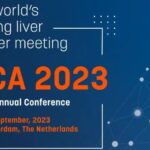Editor's Note: Primary hepatocellular carcinoma (HCC) ranks as the fourth most common malignant tumor and the second leading cause of cancer-related death in China, posing a severe threat to the health of the Chinese population. Due to its insidious onset, less than 30% of patients are suitable for curative treatment upon their initial diagnosis. Systemic treatment plays a crucial role in the management of advanced HCC. Current domestic guidelines for first-line treatment of advanced HCC mainly recommend targeted therapies, including sorafenib, lenvatinib, and donafenib, as well as immunotherapy regimens such as the "T+A regimen," Double D regimen, and STRIDE regimen. However, most advanced HCC patients eventually face issues with resistance to first-line treatment, making second-line treatment strategies a new challenge. In the Chinese Society of Clinical Oncology (CSCO) "Primary HCC Diagnosis and Treatment Guidelines (2022 Edition)," recommendations for second-line treatment of advanced HCC have been updated. In this article, we are delighted to invite Dr. Jianhui Jia from Shenyang Tenth People's Hospital to provide insightful interpretations of the recommendations in the guidelines regarding second-line treatment for HCC.Targeted Therapies
1. Regorafenib
The RESORCE study solidified the position of regorafenib as a second-line treatment for advanced HCC. Compared to placebo, regorafenib significantly extended the median overall survival (mOS) of HCC patients who progressed on sorafenib (10.6 vs. 7.8 months, P < 0.001), reducing the risk of death by 37%.
2. Ramucirumab
The REACH-2 study evaluated the survival benefits of ramucirumab as a second-line treatment for advanced HCC patients with a baseline alpha-fetoprotein (AFP) level of ≥400 ng/mL. The study demonstrated significant survival benefits compared to placebo.
3. Cabozantinib
The CELESTIAL study assessed the efficacy of cabozantinib as a second-line treatment for HCC. Results showed that cabozantinib significantly prolonged both mOS (10.2 vs. 8.0 months, P < 0.005) and median progression-free survival (mPFS) (5.2 vs. 1.9 months, P < 0.001) compared to placebo. However, this drug has not yet been approved for use in China.
4. Apatinib
The AHLEP study is a Phase III clinical trial evaluating apatinib as a second-line or later-line treatment for advanced HCC. The results demonstrated significant improvements in both OS and PFS.
Immune Checkpoint Inhibitors
1. Pembrolizumab
The KEYNOTE-224 study included 104 patients with HCC who had progressed on sorafenib, conducting a non-randomized, multicenter, open-label Phase II trial. Results showed an mOS of 12.9 months, mPFS of 4.9 months, an objective response rate (ORR) of 18%, and a disease control rate (DCR) of 64%. The KEYNOTE-394 study further validated the efficacy of pembrolizumab as a second-line treatment for advanced HCC patients in the Asia-Pacific region, including 453 patients who had failed first-line treatment. It ultimately confirmed an OS benefit (14.6 vs. 13.0 months, P = 0.0180). Currently, it has received FDA approval, with NMPA application pending.
2. Camrelizumab
In a Phase II study of camrelizumab for advanced HCC patients who had previously failed systemic therapy, promising anti-tumor activity was observed. The primary endpoint was an ORR of 32%, and the secondary endpoint showed an mOS of 14.2 months (based on 2-year follow-up data). It received NMPA approval in 2020.
3. Tislelizumab
Tislelizumab is approved for the treatment of HCC patients who have received at least one prior systemic therapy. A Phase II study aimed at evaluating the efficacy and safety of tislelizumab for unresectable HCC patients who had received at least one prior systemic therapy showed an mPFS of 2.7 months, an mOS of 13.2 months, with mPFS of 13.8 months for those previously treated with first-line therapy and 12.4 months for those treated with second-line or later-line therapy. The objective response rate was 13.3%.
While the CSCO guidelines recommend various second-line treatment options for advanced HCC, it is common in clinical practice to choose lenvatinib in combination with PD-1 inhibitors as a second-line treatment for advanced HCC following the failure of first-line targeted therapies. However, there are no specific second-line treatment recommendations in the guidelines following the failure of first-line targeted therapies. The following are some exploratory approaches currently being studied for second-line treatment of advanced HCC after the failure of first-line targeted therapies:
1. Combining Lenvatinib with EGFR Inhibitors for Synergistic Effects
Preclinical studies have shown that lenvatinib can induce feedback activation of the PAK2-ERK5 signaling pathway and the shared downstream MEK1/2-ERK1/2 signaling pathway with EGFR after inhibiting key tyrosine kinase receptors such as FGFR in HCC cells. Clinical research at Renji Hospital has shown encouraging results for the combination of lenvatinib and gefitinib. This study included 12 patients with high EGFR expression who had previously failed lenvatinib treatment. At the end of the follow-up, 4 patients achieved partial response (PR), 4 patients had stable disease (SD), and 4 patients experienced disease progression (PD).
2. Chemotherapy + All-trans Retinoic Acid (ATRA)
A team led by Dr. Shuqun Cheng from the Naval Medical University Third Affiliated Hospital published relevant research in the journal Signal Transduction and Targeted Therapy. Through a randomized, double-blind comparative study, they evaluated the efficacy and safety of the new treatment strategy of FOLFOX4 combined with ATRA for the treatment of advanced HCC with extrahepatic metastases (EHM). This study primarily targeted the challenge of the low chemotherapy response rate in advanced HCC with distant metastases. By combining all-trans retinoic acid with FOLFOX4, the study raised the objective response rate (ORR) to 24.5% and extended median survival to 16.2 months, providing a new effective treatment option for advanced HCC patients with distant metastases. Additionally, this study represents the first clinical research to validate the efficacy of all-trans retinoic acid in HCC clinical practice.
3. Radiotherapy in Combination with Sintilimab and Bevacizumab for ICI-Treated Advanced HCC
This Phase II trial utilized Simon’s two-stage design and included 21 HCC patients who had previously received ICI treatment. Patients received radiotherapy (30-40 Gy/5-8 fractions) in combination with sintilimab (intravenous injection every 3 weeks, 200 mg) and bevacizumab (intravenous injection every 3 weeks, 15 mg/Kg). The use of sintilimab and bevacizumab continued until disease progression or intolerable adverse reactions occurred, with a maximum duration of sintilimab use reaching up to 2 years. The primary endpoint was objective response rate (ORR). As of April 15, 2023, with a median follow-up time of 6.3 months, a total of 10 patients were included, with 4 achieving PR, resulting in an ORR of 40%, a disease control rate (DCR) of 80%, and an mPFS of 7.4 months (95% CI: 1.5-estimated). The median overall survival (mOS) has not yet been reached. Common adverse reactions were mild to moderate and included abdominal distension (40%), hypertension (30%), and elevated ALT and AST (20%).
Currently, new HCC targeted drugs and immune checkpoint inhibitors are progressively being applied in clinical practice, providing more options for the treatment of advanced HCC patients in China.
Reference:
[1] National Health Commission of the People’s Republic of China. Primary HCC Diagnosis and Treatment Guidelines (2022 Edition) [EB/OL]. http://www.nhc.gov.cn/yzygj/s7659/202201/a01ceb75c62b486fa459e36ba0fdfdbc.shtml, January 10, 2022.
[2] Chinese Society of Clinical Oncology Guidelines Committee. Chinese Society of Clinical Oncology (CSCO) Primary HCC Diagnosis and Treatment Guidelines 2022 [M]. Beijing: People’s Health Publishing House, 2022: 1-58.
[3] Liu Haotian, Zhong Jianhong, FINN RS, et al. IMbrave150 Study: First-Line Success of Immunomodulators in Advanced Hepatocellular Carcinoma[J]. Journal of Clinical Hepatology, 2020, 36(9): 2148-2148.
[4] Jin H, et al. Nature. 2021.
[5] Sun J, Liu C, Shi J, Wang N, Jiang D, Mao F, Gu.
Expert Profiles:

Dr. Jianhui Jia
Chief Physician
Former Director of the Digestive and Lymphatic Radiotherapy Department, Liaoning Provincial Tumor Hospital
Current Director of the Radiotherapy Department, Shenyang Tenth People’s Hospital

Song Dan
Attending Physician
Physician in the Radiotherapy Department, Shenyang Tenth People’s Hospital


